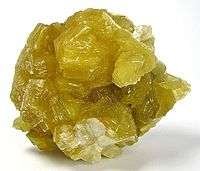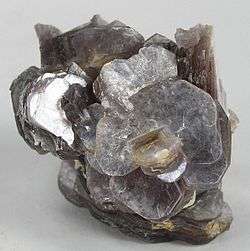Lepidolite
| Lepidolite | |
|---|---|
|
Lepidolite, Virgem da Lapa, Minas Gerais, Brazil (size 2.4 x 2.1 x 0.7 cm) | |
| General | |
| Category | Silicate mineral |
| Formula (repeating unit) | K(Li,Al)3(Al,Si,Rb)4O10(F,OH)2 |
| Strunz classification | 09.EC.20 |
| Crystal symmetry |
Monoclinic H-M symbol: 2/m Space group: C 2/m,Cm |
| Unit cell |
a = 5.209(2) Å b = 9.011(5) Å c = 10.149(5) Å; β = 100:77(4)°; Z = 2 |
| Identification | |
| Color | Pink, purple, rose-red, violet-gray, yellowish, white, colorless |
| Crystal habit | Tabular to prismatic pseudohexagonal crystals, scaly aggregates and massive |
| Crystal system | Monoclinic |
| Twinning | Rare, composition plane {001} |
| Cleavage | {001} perfect |
| Fracture | Uneven |
| Mohs scale hardness | 2.5–3 |
| Luster | Vitreous to pearly |
| Streak | White |
| Diaphaneity | Transparent to translucent |
| Specific gravity | 2.8–2.9 |
| Optical properties | Biaxial (-) |
| Refractive index | nα=1.525–1.548, nβ=1.551–1.58, nγ=1.554–1.586 |
| Birefringence | 0.0290–0.0380 |
| Pleochroism | X = almost colorless; Y = Z = pink, pale violet |
| 2V angle | 0° - 58° measured |
| References | [1][2] |
Lepidolite is a lilac-gray or rose-colored member of the mica group with formula K(Li,Al,Rb)3(Al,Si)4O10(F,OH)2.[1][2] It is a secondary source of lithium. It is a phyllosilicate mineral[3] and a member of the polylithionite-trilithionite series.[4]
It is associated with other lithium-bearing minerals like spodumene in pegmatite bodies. It is one of the major sources of the rare alkali metals rubidium and caesium.[5] In 1861 Robert Bunsen and Gustav Kirchhoff extracted 150 kg of lepidolite and yielded a few grams of rubidium salts for analysis, and therefore discovered the new element rubidium.[6]
It occurs in granite pegmatites, in some high-temperature quartz veins, greisens and granites. Associated minerals include quartz, feldspar, spodumene, amblygonite, tourmaline, columbite, cassiterite, topaz and beryl.[1]
Notable occurrences include Brazil; Ural Mountains, Russia; California, United States; Tanco Mine, Bernic Lake, Manitoba, Canada; and Madagascar.
-

Yellow lepidolite from Itinga, Minas Gerais, Brazil. Size: 6.1 x 4.9 x 3.1 cm
-

Lavender lepidolite "books" from Himalaya Mine, Mesa Grande District, San Diego County, California, USA. Size: 4.8 x 3.9 x 3.5 cm
References
- 1 2 3 Handbook of Mineralogy
- 1 2 Webmineral
- ↑ Hurlbut, Cornelius S.; Klein, Cornelis (1985), Manual of Mineralogy, Wiley, (20th ed.) ISBN 0-471-80580-7
- ↑ Lepidolite on Mindat.org
- ↑ H. Nechamkin, The Chemistry of the Elements, McGraw-Hill, New York, 1968.
- ↑ G. Kirchhoff, R. Bunsen (1861). "Chemische Analyse durch Spectralbeobachtungen". Annalen der Physik und Chemie 189 (7): 337–381. Bibcode:1861AnP...189..337K. doi:10.1002/andp.18611890702.
| Wikimedia Commons has media related to Lepidolite. |
| ||||||||||||||||||||||
| ||||||||||||||
